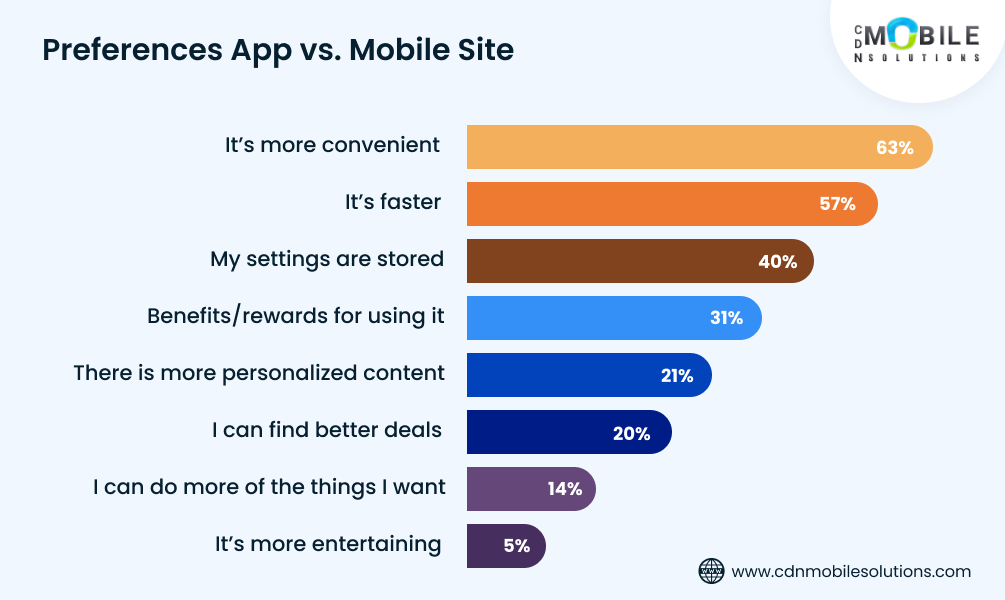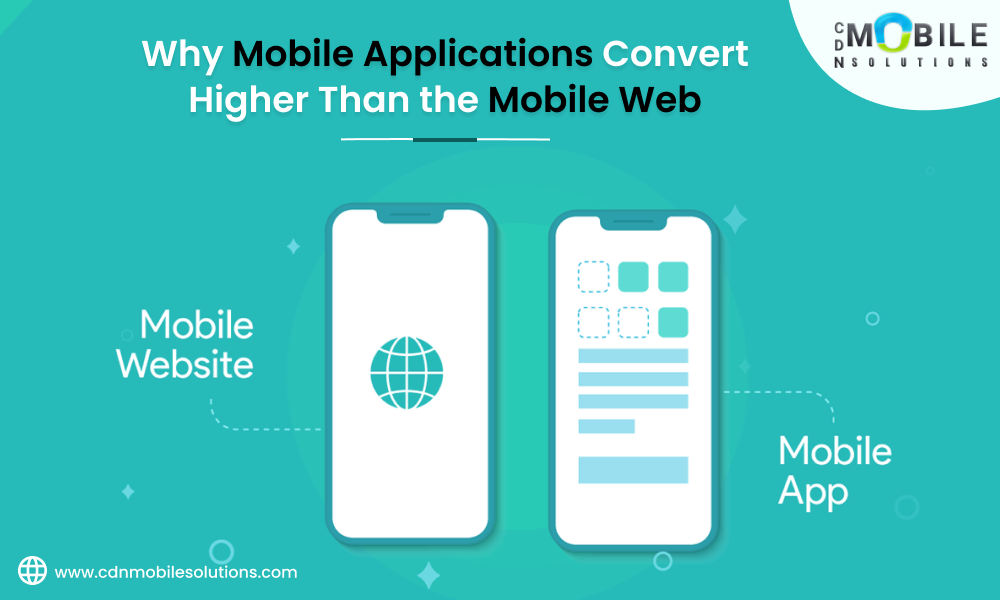In the competition to make a niche in the market, businesses frequently face trouble making awareness for their brand, holding clients, and getting higher conversion rates. The best solution to adopt is mobile app development which is quite a good one. But many people get confused about whether to adopt a mobile app or go on the web app. Which will be more beneficial?
This article will help you to understand which option is good and why. Let’s begin…
Envision yourself sitting in the solace of your home. Hold your mobile phone and begin using it. Instinctually, you will open an application. For what reason is it so? For what reason do you open the Facebook or Twitter application instead of opening them on any browser and going to their site? The explanation is basic – “Convenience”.
Utilizing an application is a more helpful and convenient method to get things done. An application loads quicker than a web and uses the local capacities of the gadget, offers a smoother route, and is safer. Organizations should have a web-based presence in this digital age, particularly by utilizing mobile applications.
Mobile application development is on the ascent, so organizations ought to embrace them sincerely in light of the fact that their conversion rate is 157% higher than that of the mobile web. Here we have created a graph with the help of which you can easily understand why Research shows that mobile applications convert higher than the mobile web.

Allow us to explore a couple of reasons to see the reason why mobile applications give a higher conversion rate.
Why mobile applications convert higher than the mobile web?
We have listed a few top reasons that can help your business to identify why mobile apps convert higher than mobile web.
Customization/ Personalisation Drives Customisation
Whether it’s a scenario of online shopping or offline shopping this statement proves to be true. Any business irrespective of the online and offline platforms can offer personalised customer experience on the basis of their
- Behavior patterns
- Interest areas
- Demographics, &
- Location
Mobile applications offer an easy method for assembling useful and real-time data. Marketers can utilize this data to customize the experience of each and every customer. A customer/user can see their shopping history and track their spending on a mobile application or a mobile web too. The thing that matters is that, on the web, customers need to sign in before they can see this information. On the mobile application, all they need is to open the application. Their record stays logged in and permits them to skip this process. This absence of one stage allows mobile applications to convert over a higher than mobile web. Spotify is one such example.
Two-Way easy Communication
Communication is another key component that drives conversions. There is certainly a wide scope of reasons and strategies for a brand and user to convey, however, these can be separated into two primary classes. Communication was either started by
- By User or
- By Business
At the point when you check out at things along these lines. It’s truly not so convoluted. An email marketing and advertising effort is an illustration of correspondence being started by the business. A customer form with an inquiry or grievance is started by the user.
Both of these classifications are better for a mobile application contrasted with the mobile web.
Utilizing the Device Features
A mobile web can’t get to the device or a gadget’s features since it is on a web server. Since mobile applications are installed on a gadget, it gives you access to specific components of a customer’s mobile phone or tablet. I’m alluding to features like:
- GPS
- Camera
- Contact records
- Compass
With the help of such features simplifies the user experience and makes the application more intuitive.
For instance, physically entering credit information can prompt errors on a mobile web. Utilizing an application, clients can utilize the camera to snap a photo of the card. The application can utilize the picture to enter the data consequently, accordingly lessening the possibility of mistakes. Uber is one such example.
Enhances Engagement
Mobile web can’t enhance engagement like a mobile application. An application gives impetuses to the clients to remain dynamic. An illustration of such an incentive is a reference program, where clients allude an application to their companions. Assuming their companions acknowledge the greeting, the client who alluded to the application acquires points. Clients can utilize the points to benefit benefits and purchase items. Whenever a client appreciates such advantages, they are bound to change over into productive clients.
A chain will begin where individuals who got the reference will, thus, send it to their friends. This cycle will proceed, and the engagement will keep on expanding. Doing likewise from a mobile web is considerably more troublesome.
Easy Offline Access
This is apparently the greatest difference between mobile applications and mobile sites. Basically, clients should be associated with the Internet to get to a mobile website.
On the off chance that they don’t have Wifi connectivity, then they need to utilize an internet hotspot from their mobile device. Assuming they are in a space without any internet facility plan, then getting to a mobile site is simply impractical.
Netflix is a worldwide leader in streaming movies, videos, etc. Ordinarily, you’d require Internet connectivity to download content. Yet, through the Netflix mobile application, users can download the required videos to their gadget and watch them later in the future while disconnected.
Speed
Mobile applications are quicker than the web. Why?
It’s simple. Sites depend on web servers for putting away data. So it can take a piece longer for content to load on a gadget since the speed is dependent upon factors like the program execution, the web hosting provider, the hosting plan, and the actual local of the server.
Simply a one-second deferral in loading time can cost you an enormous level of conversions.
Enhanced UX and UI
While a mobile site is essential, it’s actually restricted with regard to its usefulness. That is on the grounds that a mobile website depends on internet browsers to fill even basic functions.
I’m alluding to things like the back button or the refresh button. You can’t design a mobile webpage to supersede the use of an internet browser.
However, with a mobile application, you will not have any of these sorts of limitations. By the day’s end, shoppers lean toward applications to the mobile web. These are the top motivations behind why:

Enhanced Branding
Getting customers to download your application is a gigantic success regarding your branding strategies.
With a mobile site, individuals are possibly encountered your brand when they explore your site. How frequently does that occur? Also, how long does that keep going? If you’re fortunate, somebody could visit your site one time per week, and remain on there for a couple of moments for every session.
However, individuals use their mobile phones the entire day, consistently. They’ll see your application, brand name, and logo on their screen constantly. This gives them a greater amount of a motivator to open your application and convert.
Checkout Optimization
Checkouts are a definitive type of conversion. Indeed, a conversion can likewise be characterized by activity, for example, a download or pick-in, yet checkouts bring about dollars.
Mobile applications are intended for checkouts. By and large, checkouts can occur in no time. You will not get this advantage on the web.
From a mobile site, there aren’t any alternate routes. A site visitor requires to track down the item, add it to their cart, enter their payment or installment data, shipping info, and checkout. This cycle can require minutes, and there is such a lot of error room.
Take Away
You should have a mobile site. However, all things considered, a mobile site is come with limitations, and doesn’t drive conversions.
The best way to boost conversions or increase sales is with a mobile application development. Here is a quick synopsis of why mobile applications convert higher than the versatile web:
- Applications offer better personalization.
- Offers easy communication channel.
- Easy to use because it utilises device features.
- Increases engagement
- Simpler offline access
- Provides you high speed
- Unmatched UI/UX.
- Enhances brand values
- Easy checkouts and much more.
If you’re prepared to take your mobile strategy to a higher level, we’re here to help. You can reach us at www.cdnmobilesolutions.com to develop a unique app for your business that can help you to boost conversions perfectly.
Share your requirement at: sales@cdnmobilesolutions.com

